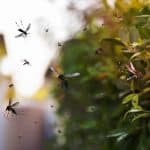We’re betting you’ve heard a lot about the Zika virus in the news lately. There’s been a lot of talk about it and it’s not sounding too good. But how much do you actually know about the virus and what you can do to prevent it? We’re hoping we can help with that!
Zika virus is a disease spread to people from the bite of an infected mosquito. The symptoms of the disease are flu-like, including fever and rash as well as Pinkeye. Very few people who are infected will get sick, and for those who do get sick, the symptoms are usually very mild. There have been some reports that women who contract the Zika virus while pregnant may give birth to children with birth defects. However, there is still a lot of ongoing research in this area and it is best to consult your doctor if this is something you are worried about.
Currently, there are no reported cases of the virus in Oklahoma. There are a few reported cases in the United States by people who have recently traveled to affected areas in South America, Central America, and the Caribbean. However, the species of mosquito that spread the disease, the Aedes mosquito, does exist in the United States and it is possible that if infected mosquitos were to breed in the country, cases of the virus could potentially spread here, too. The good news is, these mosquitos are just like any other of the pesky pests you find flying around in the summer and they can largely be avoided with simple, preventative measures.
There are 200 species of mosquito in the U.S. and they can carry diseases that are not only dangerous to people but to dogs and horses as well. So it’s important to take mosquito control seriously. One of the easiest and most effective ways to control mosquito populations around your home is to eliminate pools of standing water where mosquitos lay their eggs. Natural ponds and lakes have enough natural preventative mechanisms—like dragonflies and algae—which will kill the eggs. You only have to worry about artificial or man-made pools of standing water. Mosquitos need standing water for two of their four stages of life; if you take away the standing water, you take away their ability to reproduce.
Look for water in your gutters, in buckets, on plastic tarps, in toys or in any old, discarded equipment like tires. If you have any birdbaths, rain barrels, fountains or potted plants with water trays, make sure to dump out and replace the water in each of those at least once a week. And if you have an outdoor swimming pool (lucky you!), make sure the water is treated and that it is continually circulating, not stagnant. The same goes for other outdoor pools like hot tubs and the like. If possible, drain them when not in use.
For mosquitos that are already hatched and flying around, there are also preventative measures you can take to protect yourself, your family and your furry friends from getting bit. Like with any other pests, you want to make sure that any holes or cracks in walls, siding, doors, windows and other small gaps around your home are covered. Also, check your window screens and your screen doors for any rips or small holes and make sure to patch those up or replace them altogether as mosquitos can fit through even the tiniest of spaces. As an extra precaution, you can buy mosquito nets to cover beds and baby strollers. These are more necessary if you live in a wooded, rural area or frequently go camping but they can also prevent mosquitos in urban areas from biting while you and your family are asleep.

When you leave your home—especially if you will be outside for extended periods of time or in densely wooded or marshy areas—use mosquito repellant. Check the bottle to see how often you need to re-spray and for safety instructions. It is important to note that repellants do not protect you from any diseases. They help prevent bites, which is how diseases are transmitted. By cutting down on your risk of being bitten, you reduce your risk of contracting a mosquito-borne disease. When possible, wear long sleeves and pants, and tuck your shirt into your pants and your pants into your socks. It may look silly, but it’ll keep the mosquitos away from your ankles, one of their favorite places to bite!
Take extra precautions or try to avoid particularly buggy areas around dawn, dusk and early evening; mosquitos are most active at these times of the day. You can also replace your outdoor lights with yellow “bug” lights (you can find them at most hardware stores). These bulbs may attract fewer bugs than the normal lights would, but they won’t act as a repellant. So make sure to take other precautions on top of this one.
If you have any other questions about mosquito prevention or prevention of any other pests, contact the experts at Emtec Pest Control by calling 918-663-0613 or by filling out our online contact form. Our service areas in Northeast Oklahoma include Bixby, Broken Arrow, Catoosa, Owasso, Jenks, Sand Springs, Sapulpa, Skiatook, Stillwater, Tulsa, and the surrounding areas. In Central Oklahoma, we service Edmond, Moore, Oklahoma City, Yukon, and the surrounding areas. You can also connect with us on social media for more helpful pest control tips and information.
At Emtec Pest Control, we are committed to safe and responsible pest control. We understand that your family’s safety is your number one priority, so we make it our priority, too. If you have any other questions about any of these pests or pest control for your home or business, contact your Oklahoma pest control experts at Emtec Pest Control by calling us or by filling out our online contact form. Our service areas in Northeast Oklahoma include Bixby, Broken Arrow, Catoosa, Owasso, Jenks, Sand Springs, Sapulpa, Skiatook, Stillwater, Tulsa and the surrounding areas. In Central Oklahoma, we service Edmond, Moore, Oklahoma City, Yukon and the surrounding areas. You can also connect with us on social media for more helpful pest control tips and information. We are on Facebook.-





